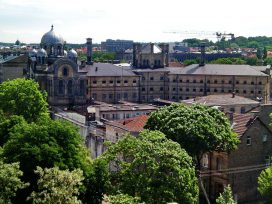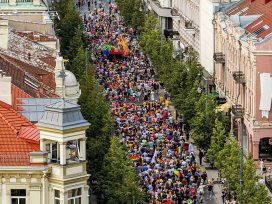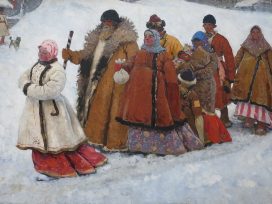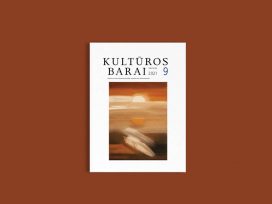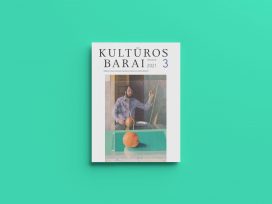Cultural changes are primarily changes of thinking; they penetrate culture and lifestyle through politics.
The requirement for unidimensional thinking was imposed upon Lithuania during the Soviet occupation. In foreign policy, this entailed promoting the world socialist revolution; on the domestic front – encouraging industrialization, the collectivization of agriculture, and the strengthening of military power. In the cultural sphere, the ultimate goal was the implementation of “correct thinking”, or more specifically, the understanding of how to fulfil the aforementioned strategic tasks. The underlying objective was the creation of communism, the promised kingdom, and to guarantee the state of wellbeing and happiness.
This was a powerful idea. It summarized the European spiritual quest that began with the Renaissance. More importantly, along with the alternative of National Socialism, it formed the substance of twentieth century life. It was only after the World War II that, in an attempt to remain democratic, it came under the arbitrage of North American capitalism.
In 1983, I published an essay in the journal Literature and Art entitled “The World Is Here”. In it, I sought to reveal Lithuania’s efforts to discover itself within Soviet internationalism. I also wanted to highlight the importance of experiencing the joy of authentic life right here, in our own land, as opposed to some distant country behind the horizon. The journalist, writer, and translator Juozas Keliuotis called the essay a persuasive analysis of Lithuania’s lived reality. Many others asked: “Who gave you the right to write like this?”
The control exerted over our lives was by then extreme: even the right to think had to be granted!
Today we already know the destiny of the two radical ideas of the twentieth century: piles of human bones, haunted by the mutants of communism and national socialism. However, we do not yet know what awaits the third one, democratic capitalism, what might be called the concept of natural social development. In fact, since the emergence during the Cold War of corporations whose budgets surpassed national budgets, and which were freed from the social responsibility for the origin of the capital, the relationship between capitalism and democracy has been troubled and troublesome. No solution has yet been found, but this is one process in which we all participate in one way or another.
We can be proud of ourselves for being active in overthrowing Soviet communism. Lithuania played a major role in expediting the fall of its major fortress, the Soviet Union.
What problems then, most importantly mental ones, have we inherited from the epoch that insisted upon the unidimensionality of thinking?
In the most general sense, the effects have been traumatic. The demand for unidimensional thinking was a blow to the national mind, a knock-out after which it was temporarily left unconscious. The lifting of the ban on thinking freely, achieved together with independence, dazed our minds, too; overwhelmed by the joy of victory, we seem to have overdosed on freedom. Typical examples? At the end of the First Republic, the mental blank brought by the Soviet occupation in 1940, obvious in the last session of the ministers. Or at the beginning of the Second Republic after independence was declared in 1990, when the business association called for the abolition of all taxes. Moreover, in Lithuania we now annually celebrate the day of “Living without Taxes”.
We have freed ourselves from the prison that held our minds captive. However, freedom to think does not always and necessarily entail freethinking. Freethinking means that the human being is able to progress from facts to generalizations, or vice versa – to descend from greatest abstractions to the most specific realities. In order to avoid disturbing the process, the thinking person has to treat abstractions as an appropriate means of thinking without ignoring or despising empirical facts; nor should s/he preference empirical facts over abstractions. These are very old problems, pertaining to any thinking culture. It took the Greeks almost a thousand years before Aristotle found a way to secure the balance between experience and thinking, and, equipped with his new science of logic, undertook the philosophical reconstruction of the world. Obsessed as they were by their inborn distrust for abstraction, it took the European barbarians two thousand years to master this art, manifest in the “critiques” of Immanuel Kant, a sceptic of the Baltic origin. Lithuanians gathered an immense empire to fight the abstractions repressively implemented by Christianity and failed to notice how their empire itself had been engulfed by the culture of their allies, the Poles, who advocated social security. When the Lithuanians came to their senses, new fashionable concepts had already coming from the West, those of positivism and pragmatism, which aimed to deconstruct classical European thinking.
It is quite surprising how efficiently Lithuanians used the difficult period of sobering. On the new ideological foundations, they restored – or, more precisely, created – a nation state, signing the declaration of Independence in 1918. Then, as a result of the great tension on the diplomatic front, they realised that creating and maintaining a nation state entails the process of translating world culture into the forms of a national culture, and most importantly, into its major form, the national language. Moreover, during two subsequent decades, they laid the philosophical and ideological foundations for such an understanding. First, there was philosopher Stasys Salkauskis’s pedagogy of personal upbringing; Antanas Maceina’s existential criticism; Juozas Keliuotis’s modern nationalism; the manifesto “Towards Complete Democracy”, formulated by a group of intellectuals; finally, there was the emergence of an absolutely authentic art, such as the works of the Ars group; poems by the young Vytautas Macernis; and the prose of immigrant Marius Katiliskis and Antanas Skema.
Karl Marx’s empirical interpretation of existence was very attractive to pragmatic minds because of its practical approach. Attentive to real facts, Marx’s analysis did not avoid generalizing about them on any level or aspect. However, processed by the mincer of the Russian mass thinking, Marx’s philosophy was turned into the ideology of Marxist-Leninism, according to which, Marx’s economic determinism and the proletarian interest were taken for the absolute and unquestionable truth.
Even the Middle Ages saw vehement discussions about whether an idea exists as an ideal object or whether it is merely a quiver of air while the word that marks the idea is pronounced. For the European mind of empirical predilection, the theory that an idea is not that what the word describes was for a very long time simply unbearable. When uttering the word “communism,” Russian Marxists similarly did not think that it could be naming an abstraction; communism was perceived as a reality, and a very accessible one. In the post-war Europe, when God was agonizing, many Western intellectuals literally went crazy about Marxism.
A similar stance was close to the Lithuanian mentality, too, as it also wanted to see behind the word the object it signified. Those who had problems with that had already crossed the Atlantic or were being transported behind the Ural mountains. After the guerrilla warfare against the Soviets was subdued, Marxism cosily settled in Lithuania. It easily rejected both ontology and gnoseology, replacing the variability of cognition by the so called theory of reflection, according to which, on a certain level of thinking, all concepts engulf reality. The so called methodology of philosopher Eugenijus Meskauskas came from, aimed at, de-ideologising Marxism and analysing its concepts according to the principle of logical impeccability. His theory did not question Marxism, though; this was left to the free will of those who got acquainted with the “methodology”.
This free will was manifest in the way young thinkers chose the trends of western philosophy that suited their tastes. They would analyse them, framing their own texts as a “critique of the western bourgeois philosophy.” This is how existentialism and almost all varieties of neopositivism, from physicalism to logical linguistics, reached Lithuania even before independence. Most were endowed with Lithuanian transcriptions and explications, which led Lithuanian thinkers not only along the beaten tracks but also across the new space of independence. Instead of Marxism, there was suddenly an abyss, into which went the thinking about the state. A couple years after the restoration of independence, we tried to cover up the absence of thinking about a responsible statesmanlike position by encouraging ourselves to reread Stasys Salkauskis and Antanas Maceina, Vydunas and other elders. All had been covered with a thick layer of dust, but there was no time to clean it from their portraits and coats. Very soon they were pushed away, while the foreground was occupied by Algirdas Julius Greimas, Vytautas Kavolis, and others. Recently their authority too has been losing its power.
The underground press, an important factor in the process of Lithuania’s liberation from the Soviet regime, failed to surpass the ideological imperative of Romas Kalanta’s public self-immolation. According to this imperative, freedom has no alternatives.
The experience of the national rebirth period as well as its ideals and principles concentrated on the Constitution of the Lithuanian Republic. What happened “under” the constitution, that is, in lived reality, can be described as the noise and rage, caused by the redistribution of wealth.
The economic, legal, and political confusion determined that our thinking, which had only recently regained freedom, started abusing it, playing with it, or simply found new masters. Meanwhile, the free critical mind either mutated and became cynical, or rapidly sunk into silence. Those voices that were still loud were easy to silence. The over-abundance of information was destroying itself, while those to whom silence was useful were stimulating the process by suppressing discordant thinking. The concept of the state as a factor that should foster national unity by motivating for the common action was pushed out of the public space. It was if the state were still seen as a repressive apparatus the way it had been during the Soviet occupation.
Today, the state of our mind can be described very simply – as deconstruction. Not only are classical ideals and principles of thinking refused, but all classical spiritual experience is also rejected. To avoid making the process look too radical, the neo-Kantian distinction between the principle and value is evoked, even though the principle is too easily yielded to cynical mockery, whereas the value is taken as a sign of one’s ability to think. Everyone now speaks about values! Human dignity, freedom, democracy, the rule of law, and human rights – these are the major values of the European Union (article 2 of the Constitution). There are also other values. This is both intellectual and convenient: principles can only be betrayed, while values – profitably sold.
Recently, scorn for abstraction has been encouraged more and more actively. Abstraction is generally seen as something from the other world; it is often referred to as a trap for freethinking, a tool for the dictatorship of the mind, an intellectual cul-de-sac.
In Europe, abstraction was for many centuries the flag and landmark of the mind, the vessel of thinking, accessible to all and everyone who wants not only to feel, sense or react in any other way, but also to think, that is, to govern both himself and his surroundings. Himself. Without waiting for advice, direction, or order and thus without allowing anyone to manipulate him. To attack abstraction means to attack the language itself, the power that distinguishes the human being from other living entities because the word is an abstraction too – the name of a thing, not a thing itself; material, but not equivalent to a thing. To attack abstraction also means to attack the state because the state, from its constitution to the plans of its ministries, is the understanding of how to organize life of the country, and it is expressed through abstractions. Their destiny is the same as that of all other plans: to remain unaccomplished, to remain outside lived reality, which is formed out of our hopes and deeds, but mostly, out of the inert materiality. In any case, they are signs that create the feeling of commonality, engendered by the sate as a contract for common life and the mind as the creator of that contract.
Thus, marching towards freedom and independence, did we really march towards an independent state? The state is first of all responsibility, both personal and communal, and thus means living not only for yourself, but also for the nation.
The Sajudis movement ensured constant supervision of the power structures and all spheres of life; this helped analyse the actions of the authorities and society in order to decide whether these actions were appropriate and to draw attention to the judgements.
Today, philosophical silence hovers over the noise of the lived reality. Various collective mental activities are organized, conferences devoted to specific areas of knowledge. However, they are largely unheard by political parties and, in any case, hardly ever say anything substantial.
Years ago, discussions at the Academy of Sciences about possible amendments to the constitution of the Lithuanian Soviet Socialist Republic helped create Sajudis. Maybe independent Lithuania’s Academy of Sciences could now suggest amendments to the new Lithuanian state, as conceived mentally as opposed to seen from the political vantage point. Maybe then the nation would be able to undertake the major task of freeing itself from radical, ideologized empiricism and would save not only abstraction, but also thinking. At least public thinking.
Because in the state of philosophical silence, which hovers over the political noise begotten by the distribution of wealth, schools have already started refusing to educate young minds and have, instead, been pandering to their whims, too easily identified as human rights. Education is now grounded in interpretation as opposed to understanding, in calculation as opposed to logic. History has become a narrative, a story, controlled by the narrator. Language as a national system of cultural meanings and significations is no longer a major criterion, especially in the face of the world’s commercial and political demands and the rapid digitalization of knowledge.
All this is supposedly new and modern, and we certainly we cannot refuse to adapt to the global processes.
But what about the ideals and principles of Sajudis?
Speaking diplomatically, I do not know.
Eurostat contends that Lithuania is a socially irresponsible state. National authorities claim that massive emigration of Lithuanians is the ultimate good.
Foreign political scientists say that our democracy is sick and our politics is in crisis, but only the oppositional parties agree with them, even though they are not unanimous, either.
It has been said that each year the amount of money equal to the yearly Lithuanian national budget evaporates through untaxed income. I do not know whether this is true because the data is classified. It is a business secret.
There is so much I do not know. There is so much we do not know.
I do not know whether the national stadium will ever be built in Vilnius. I do not know whether eighteen years from now artworks will finally be bought for the national collection, or whether this will remain the business of a handful of individual enthusiasts. I do not know what will become of the Rulers’ Palace. Finally, given the low birth rates and the enthusiasm in welcoming immigrants, I do not know how long the Lithuanian nation will survive.
But I know that my world is here. Even more – the world is here. The world is here. I am responsible for it together with my nation because this world is mine. And if I do not know how this responsibility should be manifest, I have to find out.
It would be good, though, that instead of “I,” I could say “we,” freely and joyfully.
Lithuania is not only brave, as its infantile trademark says; it is also a clever country, as Sajudis, said. Some of us still believe that.
This article is based on a speech delivered at the Lithuanian Academy of Sciences, entitled “Lithuania: From the National Rebirth Period to the European Union”, organized to celebrate the twentieth anniversary of Sajudis, the Lithuanian national reform movement established on 3 June 1988; its major aim was Lithuania’s independence from the Soviet Union.
